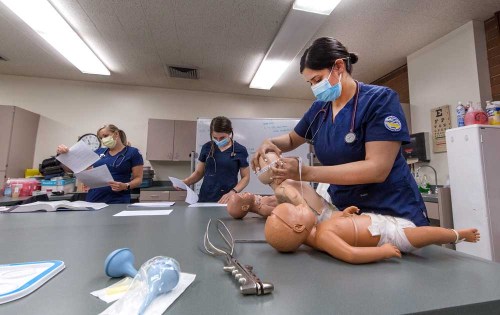Hospital allows nursing students to continue clinical training during COVID
Published 7:00 am Friday, April 24, 2020

- First-year nursing student Destiny Valdovino, right, measures the head of a baby manikin at a newborn and postpartum lab on Thursday at Blue Mountain Community College.
PENDLETON — A silver lining of the pandemic may be people and organizations acting selflessly to help frontline workers as they take on COVID-19.
One example came this month as Blue Mountain Community College’s nursing program loaned equipment and supplies to St. Anthony Hospital — gowns, IV pumps and a feeding pump normally used during on-campus lab and simulation exercises. The college also offered up several hospital beds for when or if the hospital reaches capacity.
Trending
The act of altruism also illustrates the importance of relationships between nursing schools and the hospitals where they receive clinical experience. Especially right now.
The novel coronavirus surged in this country just as nursing students were finishing the last couple months of programs and preparing to graduate.
“Despite Gov. Brown’s executive order saying all colleges and universities must place their curriculum and coursework online, she exempted nursing programs,” said BMCC nursing program director Laurie Post.
She said students attend classes in Zoom rooms, but continue to do simulations and labs on campus, observing social distancing rules and wearing masks. They do clinical training at the hospitals.
While some of the nation’s nursing programs and hospitals have canceled on-site clinical training for nursing students, BMCC students continue to do clinical training at St. Anthony Hospital, Pioneer Memorial Hospital in Heppner and Wallowa Memorial Hospital in Enterprise.
“They’ve been very supportive of the students’ learning needs,” Post said. “Our students are on track to graduate in June, take licensing exams and enter the workforce.”
Trending
As the pandemic descended in early spring, St. Anthony hospital administrators considered whether to temporarily stop the clinical program. Other hospitals in the state, including the Oregon Health & Science University in Portland, have hit the pause button. Registered nurse Elizabeth Michael, St. Anthony’s clinical education manager, said the hospital considered long and hard about whether to continue clinicals, and after discussions with BMCC decided to go ahead.
There’s one big caveat.
“Safety is primary,” Michael said. “We don’t want students to take care of COVID-like patients. If someone gets to the point where they feel uncomfortable, they need to be able to wave the white flag.”
Hospitals are seeing fewer patients since stopping nonessential procedures as a way to save protective equipment, staff and space for an expected surge of coronavirus patients. That’s a challenge when training tomorrow’s nurses, but Post said there is one unexpected benefit to training during a pandemic.
“With the decreased census at hospitals, students may not have as many patients to care for,” Post said. “However, they do have the unique opportunity to observe the hospital personnel as they prepare for and enact policies for the pandemic in real time.”
They can listen, watch and learn, she said, and then discuss and digest everything during class discussions.
“What they learn gives us opportunities for discussions on global health, public health and how nurses take measures to prevent the spread of contagious diseases,” she said.
As the school’s 20 second-year students cruise toward graduation, Post feels blessed that clinical opportunities for her students didn’t dry up.
“Where a lot of schools in the state are not able to send their students to clinical facilities,” she said, “BMCC is one of only a few in the state able to have students in clinical settings.”
So loaning St. Anthony some gowns and pumps and beds isn’t really a question, Post said, but rather a way of giving back.
“We’re so appreciative of these hospitals being so accommodating and welcoming to our students during these uncertain times,” said BMCC President Dennis Bailey-Fougnier.
“BMCC has always had an exceptional relationship with St. Anthony, and they’ve been a wonderful partner to our nursing program,” she said. “Loaning our equipment is the least we can do to support our local hospital community during this challenging time.”









